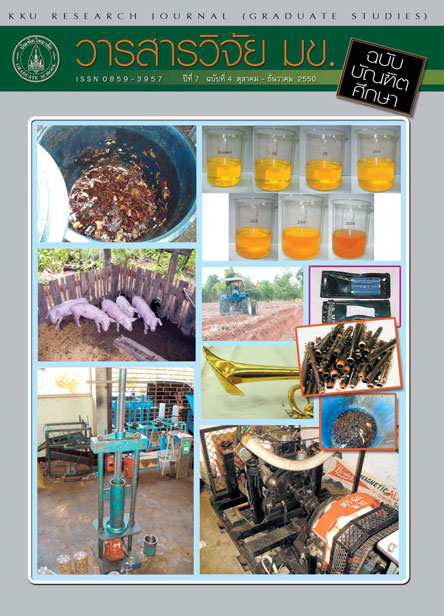Illness Experince of Persons with Osteosarcoma(ประสบการ์เจ็บป่วยของผู้ที่เป้นโรคมะเร็งกระดูกชนิดโอซาโคมา)
Keywords:
Illness experience(ประสบการณ์การเจ็บป่วย), Osteosarcoma(โรคมะเร็งกระดูกชนิดอ๊อสตีโอซาโคมา)Abstract
การวจัยครั้งนี้เป็นการวิจัยเชิงคุณภาพ มีวัตถุประสงค์เพื่ออธิบายความหมาย การดูแลรักษา และปัจจัยเงื่อนไขเกี่ยวข้องในการูแลรักษอาการเจ็บป่วยของผู้ที่เป้นโรคมะเร็งกระดูกชนิดอ๊อสตีโอซาโคมา เก็บข้อมูลโดยการสังเกต การสัมภาษณ์เชิงลึก และการวิเคราะห์ข้อมูลโดยใช้วิธีการวิเคราะห์เนื้อหา ผลการวิจัยพบว่ความหมายของโรคมะเร็งกระดูกชนิดอ๊อสตีโอซาโคมาคือ โรคร้ายรงชนิดหนึ่งที่รักษาไม่หาย และมีอันตรายต่อชีวิต การดูแลรักษามี 4 ระยะ ในระยะแรกที่รับรู้อาการผิดปกติ และซื้อยามารับประทาน ระยะที่สองปฏิเสธการรักษา ไปแสวงหาการรักษาด้วยวิธีอื่น ระยะที่สามยอมรับการรักษาด้วยวิธีผ่าตัดที่สูญเสียเกี่ยวกับอวัยวะร่วมกับการให้ยาเคมีบำบัด และระยะที่สี่คือการฟื้นฟูร่างกายและจิตใจ ส่วนปัจจัยเงื่อนไขเกี่ยวข้องในการดูแลรักษา คือตัวผู้ป่วย ครอบครัวและเครือญาติ การขาดความรู้ความเข้าใจเกี่ยวกับการรักษา ความไม่แน่นอนของวิธีผ่าตดที่อาจสูญเสียอวัยวะ ความรุนแรงของโรค ระยะเวลาของการเจ็บป่วย หน้าที่ความรับผิดชอบและความคาดหวังThis qualitative research aimed to explain the meanings, treatments, and conditioning factors related to the symptomatic treatment of osteosarcoma. The data were obtained through observations and in-depth interviews, and analyzed through content analysis. The results of this study are as follows: The meanings was regarded as a severe, incurable, and life threatening disease. Concerning the treatments in the first phase, the patients realized abnormal symptoms and primarily treated themselves by taking un-prescribed medications to relieve symptoms. In the second phase, they may have refused the doctorûs treatments and used alternative therapy. In the third phase, the patients underwent surgery and received chemotherapy. The last phase was one of physical and emotional rehabilitation. The conditioning factors related to the treatments: the patients, their family members, inadequate knowledge, uncertain treatments, a severity of the disease, a duration of having the disease, duty, responsibility, and expectation.



